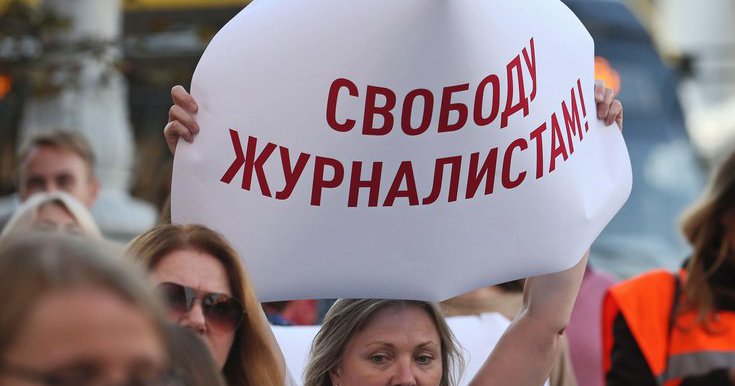
The cases of Barysevich, Andreeva and Chultsova have become symbols of a new stage in the Belarusian state’s campaign against journalists. At the end of December, five employees of Press Club, a project that organises media trainings and lectures by renowned reporters and media managers, were arrested. Yulia Slutskaya, Alla Sharko, Siarhei Olshevsky, Siarhei Yakupov, and Pyotr Slutsky were all accused of tax evasion and sent to pre-trial detention.
In January 2021, the security services arrested Andrei Aleksandrov, a journalist and media manager who worked for the BelaPAN news agency. Aleksandrov was accused of paying the fines of civic activists. As in the case against Belsat journalists, the investigation against Aleksandrov qualified his actions as “strongly violating the civic order”.
In February, the security services conducted dozens of searches in the apartments of BAJ representatives, as well as the association’s Minsk offices. According to the ministry of internal affairs, the BAJ is suspected of organising and financing the protests.
Outlawed media
Belarusian officials and state propaganda outlets like to claim that journalists who are currently being persecuted are not really journalists. This kind of absurd proposition is connected to another part of the state’s strategy: deliberately pushing independent media out of the country’s legal framework.
Belsat TV, for example, has never been officially accredited in Belarus: the authorities simply ignore all requests without explanation. For journalists, the lack of accreditation means restricted access to official information, the possibility of being detained, having their equipment confiscated and the imposition of huge fines for violating media law.
In early October 2020, all foreign media found themselves in Belsat’s position: the foreign ministry cancelled their accreditation en masse. New accreditation was only issued to Russian state media. At the same time, the authorities revoked the status of TUT.by, the largest information portal in the country. This kind of manipulation allows the Lukashenka regime to publicly declare that there is no persecution of the media in Belarus.
Another form of pressure involves blocking websites, as well as the obstruction of the printing and distribution of newspapers. In August 2020 alone, the ministry of information restricted access to more than 70 internet resources, which were allegedly “used to coordinate actions to organise mass disobedience by representatives of the authorities.” The blacklist included a huge number of media outlets: the websites of Belsat, Radio Liberty, naviny.by, Euroradio, sports publication Tribuna and others.
PrintIgor Ilyash | Radio Free (2021-03-23T11:50:50+00:00) How Lukashenka declared war on Belarusian journalists. Retrieved from https://www.radiofree.org/2021/03/23/how-lukashenka-declared-war-on-belarusian-journalists/
Please log in to upload a file.
There are no updates yet.
Click the Upload button above to add an update.